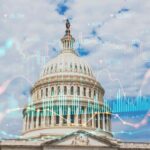On Friday, May 6, a bill that would have imposed a two-year moratorium on certain sorts of proof-of-work (PoW) crypto mining businesses in the state of New York was dealt a major setback.
The bill is now being considered by the Senate Environmental Conservation Committee. Still, according to a schedule posted early Friday morning, the committee has opted not to take up the bill at its last meeting of the current legislative session.
In particular the, Senate Bill S6486D:
“Establishes a moratorium on cryptocurrency mining operations that use proof-of-work authentication methods to validate blockchain transactions; provides that such operations shall be subject to a full generic environmental impact statement review.”
There has been strong opposition to the legislation from many members of the cryptocurrency industry who believe that the moratorium, which is much narrower than an earlier version that sought to impose an all-out ban on mining for three years – could be the start of a downward road that eventually leads to the outright prohibition of all cryptocurrency mining in the state of New York.
Opposition to the Bitcoin mining bill
Indeed, CEO of MicroStrategy Michael Saylor recently argued on May 4 that the proposed regulation of Bitcoin energy use in New York City is ‘damaging to the environment.’
He opined:
“The proposed regulation of Bitcoin energy use in New York is damaging to the environment, reputation & economy of NY and demonstrates that the law can be manipulated maliciously to harm a competitor. If this disturbs you, please let the NY Senate know.”
Whether or not it becomes legislation, the planned ban is also a concern from both the sector and politicians since it sends a poor message to the crypto space. Opponents fear that the measure would cause businesses to leave the state, resulting in tax revenue and employment loss.
The committee has the option of passing, rejecting, or ignoring a piece of legislation that has been sent to the committee.
As a result of the committee’s decision not to consider the bill, passage of the legislation before the full Senate for a vote is considerably more difficult; nonetheless, it is still conceivable.









